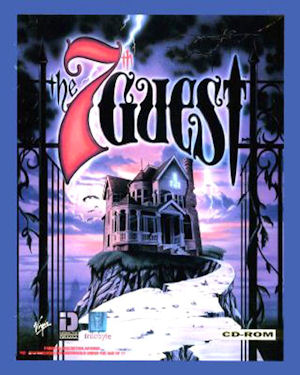Anthony's Film Review
The 7th Guest
(Video Game, 1992)

The 7th Guest is not a bad puzzle game and certainly a wonder for its time...
Whenever I look back on the history of computer games, I often take note of milestone games and technological breakthroughs. One such advancement in gaming was the use of video footage. It was in the early 1990s that a puzzle game by Trilobyte called The 7th Guest demonstrated the use of full-motion video within an interactive game. This was around the time that games were just beginning to transition to CD-ROM format from the floppy disk format. Consider the greater data capacity of the CD, anything was possible.
So here's what the game looks like. Imagine that you're in the foyer of a haunted mansion, seeing the room from the eyes of a nameless protagonist. You can tell your character to rotate or move to another spot in the room. When this happens, you are watching the room move. It's a smooth realistic transition, not like early games where the screen just changes instantaneously. You can also examine certain objects closely and find secret passages.
The essence of The 7th Guest is puzzle solving. The game features approximately 20 puzzles throughout the mansion. Winning the game involves successfully completing each puzzle. For example, divide a cake in a certain way, or move opposing knights and bishops across a chessboard so that they take each other's place. What's challenging is that no rules or objectives are given for each puzzle. It is up to you to play around with the puzzle, figure out how it works, and determine what you must do.
There is a story and a cast of characters, but both require little mention. Basically, the haunted mansion once belonged to a mysterious toymaker named Henry Stauf. For reasons unclear, he invites several people to his mansion. During the game, you see moments with these guests, who look like either ghosts in the present or visions of events past. For me, I usually like to know the primary and secondary characters of any game with a story. Here, I felt no inclination to do so. If you're looking for a game with more memorable characters, you won't really find it in The 7th Guest.
But the game is still fun enough to play. As an intellectual, I enjoyed challenging my mind with Henry Stauf's puzzles, especially with the ambient musical soundtrack by George Sanger, a.k.a. The Fat Man. Like I said, I would have liked it a lot more if the story and characters were developed such that I really cared about them. When I finished the game, I just thought the ending was OK. At least The 7th Guest can be remembered as a game that was technologically advanced for its time. Nostalgic computer gamers will certainly love it for that.
Anthony's Rating:










For more information about The 7th Guest, visit the Internet Movie Database and Moby Games.
In addition, check out my review of The 11th Hour.
Home
Film Reviews
Other Reviews
Commentaries
Links
About AFR
RSS Feed
Privacy Policy
E-mail Anthony











